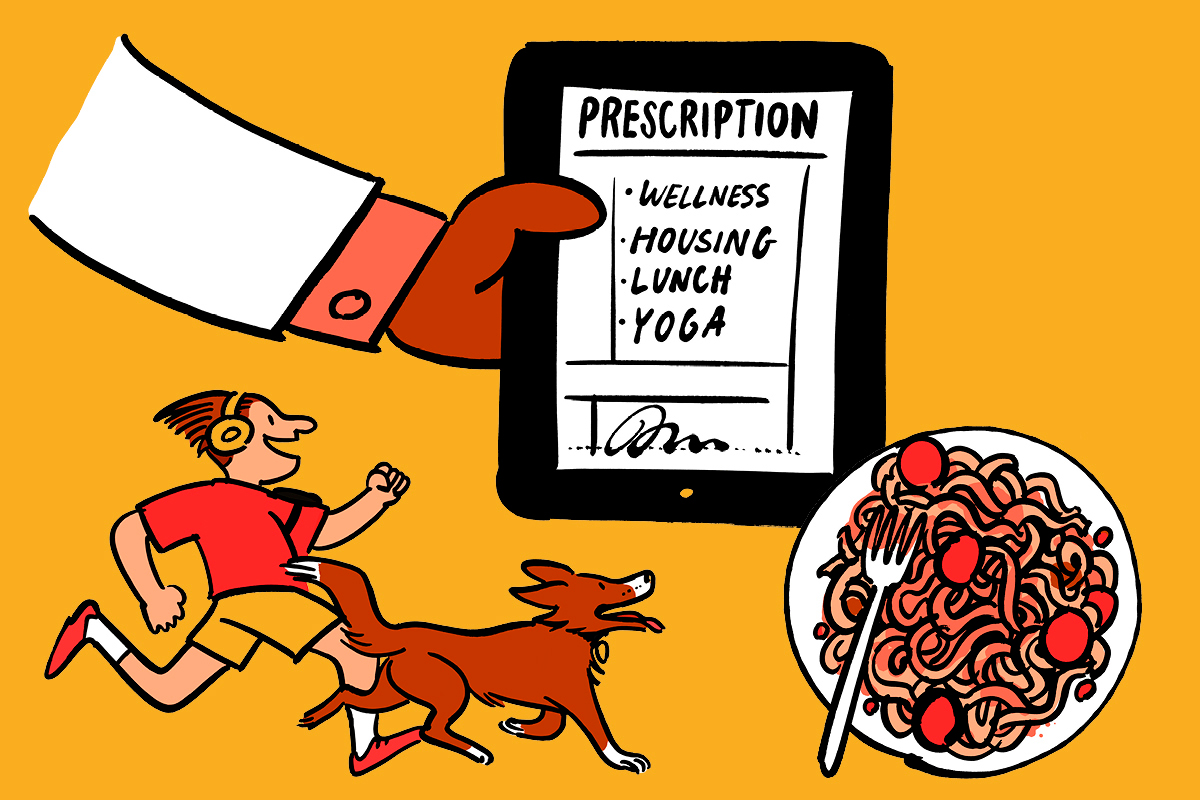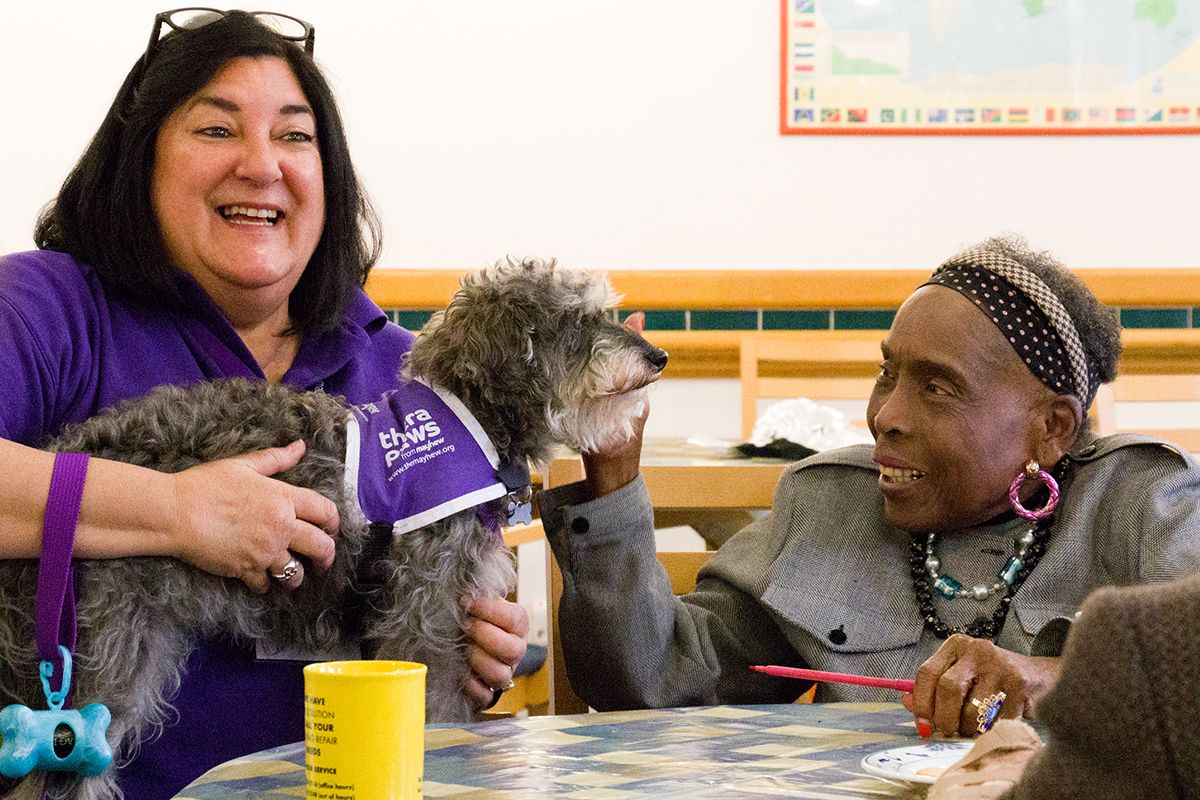You are viewing 1 of your 1 free articles
The housing association connecting patients and local services
In many communities, GPs are the first port of call for people who have problems that potentially have non-medical solutions. Rhiannon Curry travels to Merseyside to see how one housing association is helping to bring patients and local services together. Illustration by Mark Long
You can see the queue outside Trinity Church in Ellesmere Port from the other end of the street. The people gathered outside are an eclectic mix: workers, mums with prams and older people clutching shopping bags throng together to push through the doors into the airy church building.
They are here for Wednesday Welcome, a weekly lunch club run by workers and volunteers that provides a hot meal for anyone who needs one.
Next door, the church hall is home to Port Grocery, a community food project that members pay into to receive groceries at a greatly reduced cost.
“ForHousing has linked existing social projects with a local GP and housing officers via a software platform”
Many of the attendees are here thanks to an innovative new project run by For Housing, a local housing association that is part of For Viva Group.
The social landlord’s aim is to draw together services in this town, south of the River Mersey, and provide a comprehensive support network for some of its most vulnerable social housing tenants. The initiative is called Passport to Wellbeing.
In what is believed to be the first project of its kind, ForHousing has linked existing social projects with a local GP and housing officers via a software platform designed to bring referrals into the 21st century.
The housing association had an existing well-being team providing “wraparound holistic support for any tenant who has a need”, explains Toria Buzza, who leads the work at ForHousing’s Ellesmere Port office. That need could be to do with financial or relationship problems, or help with social issues or housing.
The new scheme has made the whole process more effective and brought those in need to the attention of the service providers who could help them.
Dr Rajesh Rajan, clinical director at the nearby Westminster GP Surgery, is often people’s route into the scheme.
“Being able to put people in contact with these other services gives me an extra choice, another route for the patients” – Dr Rajesh Rajan
He works in one of the area’s most deprived boroughs, and had been struck by the number of ForHousing’s tenants who were visiting him on a regular basis with needs that he believed could be treated through non-medical methods.
“The ForHousing project was particularly appropriate for us,” says Dr Rajan. “This is one of the poorest areas in Cheshire and nationally it has high rates of poverty-related factors, like depression and social isolation.
“Being able to put people in contact with these other services gives me an extra choice, another route for the patients.” His options before had been “rigid”, he adds. “It was, ‘Is this person bad enough to go to hospital?’ And if not, it was really the council that needed to help.”
Now, using software called Elemental, Dr Rajan can ‘prescribe’ social activities in the same way he would medicine.
When he sees a patient who he thinks could benefit from referral to the Passport to Wellbeing programme, he is able to send that person to outside services using the software on his existing system.
“It is formalising the referral process,” Ms Buzza says. “And it’s also helping us to test how we use outside referral bodies for our tenants.”
The services available through the pilot include relaxation programmes, Nordic walking, healthy eating sessions, counselling and Wednesday’s lunch club, which for some people is their only social interaction during the week.
One of the companies ForHousing is working with is Healthbox, which is running a three-year, Lottery-funded scheme called Wellbeing High Street. Nicola Taylor, the project’s volunteer co-ordinator, explains how patients have been successfully referred for activities including confidence-building sessions or yoga.
“We’ve had a lady going along to [yoga] and she came from quite a dark place,” Ms Taylor says. But she enjoyed the sessions so much that she decided she wanted to volunteer with Healthbox, which has given her a reason to go out.
“Her confidence has grown, and that has been so nice to see – and that all came from her initial involvement in this,” Ms Taylor says.
“What is core in this is keeping the person at the centre,” adds Jenny Chapman, group director of innovation and excellence at ForViva. “It is about putting people in control of what their pathways are.”
Over the project’s first eight months, there has been a drop-out rate from referrals of around 50% as people struggle to trust the new system. “But what we found was that people who had dropped out ended up coming back in because they saw other people benefiting from it,” explains Ms Buzza.
“We are not about displacing clinical or medical services,” Ms Chapman stresses, “but there are some people who will continually present themselves to a GP and that GP feels that it isn’t a clinical problem.”
The programme is not targeting people with long-term conditions, she explains, but rather those who a GP suspects have issues related to debt, managing their home, or social interactions.
“What GPs have is a very limited time to be able to spend with someone who is presenting as a patient,” Ms Chapman points out. Now, with a single click, Dr Rajan can send the patient’s details to the housing association, which then follows up with the tenant.
“That information then automatically goes into the system to the other providers on the platform,” continues Ms Chapman. “Perhaps it is Mr Jones who goes to his GP and says, ‘Actually I don’t get out very much and I think it is making me feel a bit depressed’. We can give Mr Jones a number of options for engaging with different agencies; he agrees and that agency will then contact him. All of that information stays in one area, so if Mr Jones goes back to the GP, the doctor can see he’s gone to the lunch club and ask how he’s feeling about it.”
The services are already out there, she explains, but people are just not linked up to them. A housing association has a natural role as a co-ordinator in the local area and can access people’s homes, allowing an insight into their lives that other services may not get.
“What is core in this is keeping the person at the centre. It is about putting people in control of what their pathways are” – Jenny Chapman, group director of innovation and excellence, ForViva
“As public services are being squeezed tighter and tighter, the need isn’t going away, and housing associations have a key preventative role,” says Ms Chapman.
One of the major aims of Passport to Wellbeing is to avoid high-cost public service intervention such as an acute hospital admission, which costs around £450 a day.
“Things are moving towards community-based care instead of sending people to hospital, which can be very expensive,” says Dr Rajan, adding that the key for him is that the process is very simple – involving little more than one click.
“When we talk about services in the community it is shocking to me how many services are out there and you don’t even know about them. The NHS says we need more money. We don’t need more money, we need what is already there to be utilised properly.”
Treating symptoms medically often only has a limited effect, he says, if the underlying problems are not being dealt with.
Back at Trinity Church, a roast lunch is being served at one end of the hall while at the other, guests sift through donations of clothes and household goods from the local Aldi supermarket.
Rita Lewis, founder of Wednesday Welcome and Port Grocery, whirls into view, seemingly chatting to four people simultaneously and directing four others to fetch this or that. The lunch club grew from her desire to balance people’s need to eat better food cheaply, and the need to cut down on supermarket waste.
Now, supermarkets including Marks & Spencer and local wholesalers and restaurants including Nando’s, KFC and Pizza Hut donate food close to its use-by date, which volunteers then divide up, label and distribute.
Some of the food goes to cooking Wednesday’s lunch (which can attract around 200 people each week) while the rest is added to Port Grocery. Members of the grocery pay £5 a week and typically receive £25 worth of food, although Ms Lewis says that those in the greatest need are helped more. Around 80% of people who use the grocery are in work, she says, but there are a number of customers who need more support.
“The people who really need the help have the most chaotic lifestyles and are the most unreachable,” she says. “We have found that other services, like district nurses and social workers, come here on a Wednesday because they can find some of the people they need to help.”
Not only are the lunch club and grocery providing an essential service to the community, but Ms Lewis estimates that they also save six tonnes of food a week from landfill. The organisation has also begun holding cooking classes on a Monday to help those shopping at the grocery to use their food in the best way.
“This is not digital for digital’s sake: it is a technological solution that allows the best of human relationships to be capitalised” – Jenny Chapman, group director of innovation and excellence, ForViva
Mandy Welsh is one of those who has benefited. She had been experiencing some problems with anxiety, which left her struggling to leave the house or deal with her financial situation. She has now been referred to Trinity Church and has been going along to the Wednesday events. “I was anxious about going but I found a table in the corner, out of the way, and that helped,” she says. “I’ve met people there, which has been nice.”
Ms Welsh has also been helped to complete application forms for benefits and given housing support, so she is no longer struggling to pay her rent and is able to maintain her tenancy.
The Passport to Wellbeing pilot has a cap of 200 people, with four agencies on the platform, all in Ellesmere Port. ForHousing wants to keep the pilot small to test it, but will evaluate it after 12 months. There is potential to roll out the project across the landlord’s portfolio in Knowsley, Oldham and Salford, if it is deemed a success, based on its impact on participants. “This is an ideal test bed,” Ms Chapman explains. A decision on the roll-out will be made in March.
Elemental was set up by Leeann Monk-Özgül and Jennifer Neff, two community development workers who envisaged a digital solution to the problem of local services not working together.
Ms Chapman says: “This is not digital for digital’s sake: it is a technological solution that allows the very best of human relationships to be capitalised. The platform is never going to replace the human touch.”
What it does do, however, is give ForHousing another, potentially simpler way to help keep vulnerable tenants in their homes, make sure they are not admitted to hospital, or enable them to get support before their problems become acute.
As Ms Chapman concludes: “If we aren’t supporting people to retain their tenancies, then we aren’t doing the role of a landlord.”












